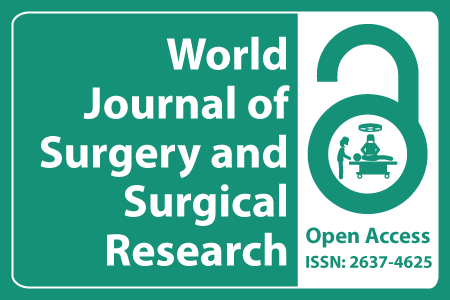
Journal Basic Info
- Impact Factor: 1.989**
- H-Index: 6
- ISSN: 2637-4625
- DOI: 10.25107/2637-4625
Major Scope
- Oral & Maxillofacial Surgery
- Urological Surgery
- Surgery & Surgical Research
- Cardiac Surgery
- Transplant Surgery
- Cardiovascular Surgery
- Robotic Surgery
- Neurological Surgery
Abstract
Citation: World J Surg Surg Res. 2020;3(1):1268.DOI: 10.25107/2637-4625.1268
The Relationship between Body Mass Index and Papillary Thyroid Cancer Pathology Aggressiveness
Song I Yang1*, Kwang Kuk Park2 and Kim Jeong-Hoon1
1Department of Surgery, Kosin University College of Medicine, Busan, South Korea
2Department of Surgery, Park Hospital, Busan, South Korea
*Correspondance to: Song I Yang
PDF Full Text Research Article | Open Access
Abstract:
Purpose: Obesity is a known risk factor for several cancers, including breast, colon, esophagus, kidney, uterus,
and thyroid. Recent studies have reported that higher Body Mass Index (BMI) is also associated with more
advanced stage. The aim of this study was to investigate the clinicopathological relevance between BMI and
Papillary Thyroid Carcinoma (PTC).
Methods: A total of 4,338 patients surgically treated for PTC from January 2005 to December 2015 were included
in this study. Medical records and pathologic reports were reviewed retrospectively. According to BMI, patients
were divided into four groups: underweight (2.5%), normal (63.2%), overweight (29.7%), and obese (4.6%).
Clinicopathological factors were analyzed and compared between normal and other groups.
Results: According to the results, 3,683 patients were women (84.9%) and mean age was 47.1 years. There were
significant associations between BMI quartiles and Multifocality, cervical lymph node metastasis, or TNM stage.
Increased BMI was strongly associated with Multifocality and extrathyroidal invasion. There were no differences
in recurrence according to BMI quartiles.
Conclusion: Increased BMI might elevate the risks of aggressive clinicopathological features, such as
extrathyroidal invasion, multifocality and thyroiditis. To confirm this result, further studies with long-term
follow-up and more patients are required.
Keywords:
Obesity; Body mass index; Papillary thyroid carcinoma
Cite the Article:
Yang SI, Park KK, Jeong-Hoon K. The Relationship between Body Mass Index and Papillary Thyroid Cancer Pathology Aggressiveness. World J Surg Surgical Res. 2020; 3: 1268..













